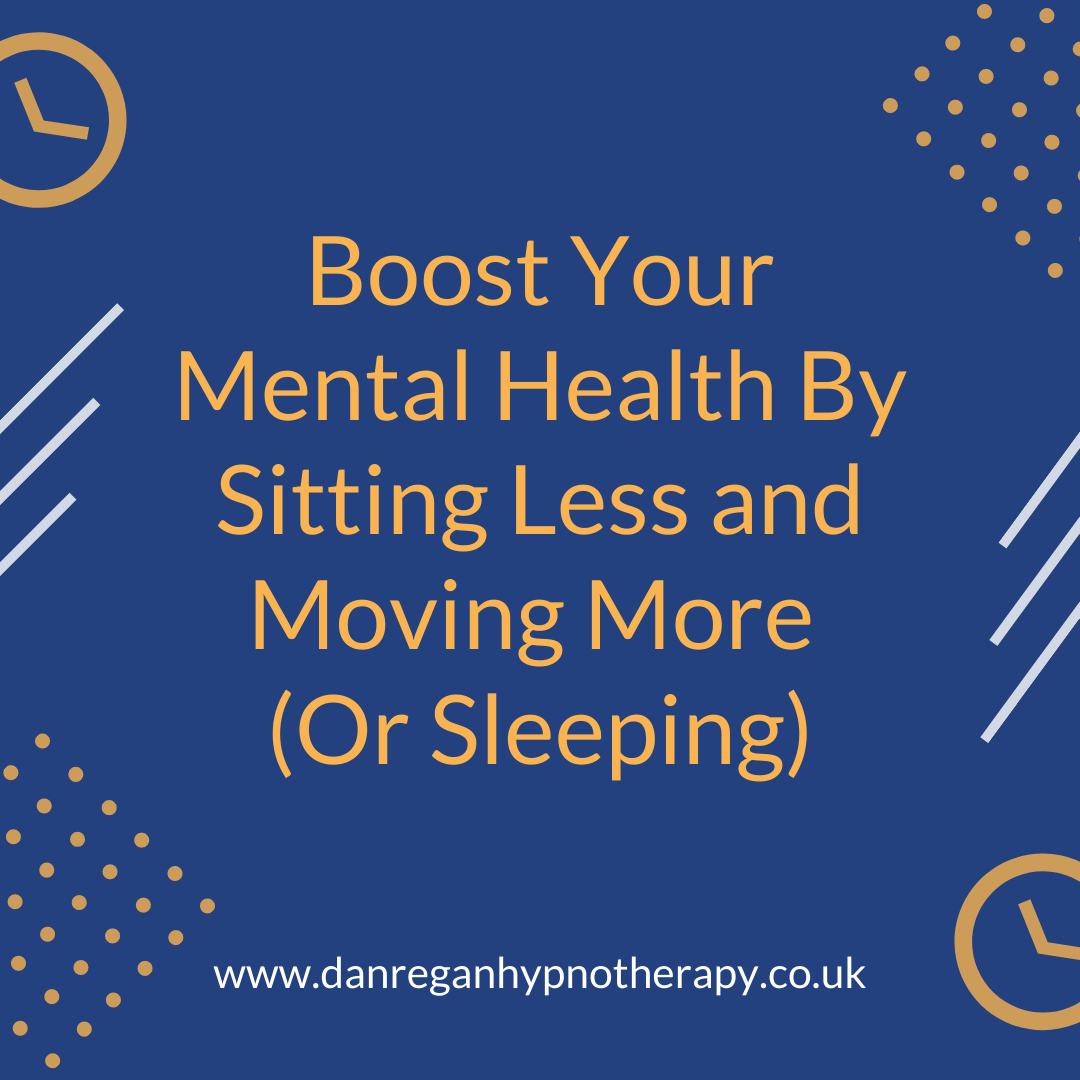Boost Mental Health By Sitting Less and Moving (or Sleeping) more
A whole mass or evidence demonstrates that being sedentary is bad for your mental health and physical health. And a further mass of research shows the positive impact on mental health issues such as anxiety, stress and depression, from exercise.
The link between moving more and better mental health is pretty conclusive and widely recognised. I mean, even this week in the Government coronavirus briefing, there was talk about the benefits of exercise for your mental health (featuring the Health secretary and Welsh ex-footballer Robbie Savage!).
Now if you’ve been following any of my posts or articles for a while you may have gathered that I’m a bit of an exercise nut. From hating PE at school through to running and bootcamp, exercise has become an integral part of my routine, lifestyle and well-being. Although sometimes I still have to have a word with myself and push myself to get into gear and get started on moving.
Throughout the covid-19 lockdown I’ve managed to keep going with three runs a week and three bootcamp sessions (in the garden…which is now more mud and dust and less grass where I’ve worn it away slamming my tyre!).
Yet the lockdown and working from home has also meant more time for sitting and that kind of low energy expenditure stuff. From working at home on my laptop (like right now) to watching a film with the kids, there has been more time than usual being sedentary.
We know long periods or a lot of sedentary time is bad for your mental health, so what should you be doing with that time instead? Should you be doing high intensity exercise or are there other, less intense, things that can boost your psychological well-being?
Sedentary Behaviour and Your Health
Sedentary behaviour refers to sitting or lying while expending low amounts of energy. Spending 6-8 hours a day sitting around like this increases the risk of cardiovascular disease, type 2 diabetes and numerous other health conditions. Perhaps worryingly, thirty percent of adults in the UK are sedentary for 6-8 hours a day during the week and this rises higher over the weekend. The risk of chronic disease is greatly increased if you live this kind of lifestyle where you spend many hours sitting at work, in the car and even for leisure activities.
It’s been estimated that the cost of sedentary behaviour on the UK NHS approaches one billion pounds a year and could be responsible for thousands of deaths each year (Heron et al, 2019).
If your lifestyle involves a lot of sitting around then there could be consequences for your physical health and it could increase your risk of illness or death. And having serious health issues is likely to cause increased anxiety, stress, worry, depression and possibly pain and discomfort (impacting on quality of life).
For more on this, check out this post from last year for more about the impact of sedentary behaviour on your physical and mental health: Is Sedentary Behaviour Affecting your physical and mental health?
Anxiety, Depression, Mental Health and Moving
On the flip side to being sedentary, a whole mass of research and evidence exists to support the mental health benefits of exercise and moving.
Aerobic exercise has shown a significant large overall anti-depressant effect on adult patients with depression (Morres et al, 2018). Aerobic exercise brought about a large or moderate to large improvement in depression in a wide range of delivery formats through equipment-based or equipment-free modalities, inside or outside a hospital, outdoors or indoors, in groups or individually, and in cohorts with outpatients or inpatients, and with different depressive symptom severity.
And another research analysis suggested that anaerobic exercise may be equally effective in reducing depressive symptoms compared to aerobic activity, which suggests that resistance training may be an option for those where aerobic exercise is inappropriate or where they do not have the motivation for aerobic exercise (Stathopoulou et al, 2006).
There may be many psychological reasons for the mental health benefits of exercise for issues such as depression and anxiety. Engaging in exercise may increase perceived coping skills and may lead to less time for rumination, worry and anxiety. And of course, being active tackles the tendencies associated with depression (passivity) and anxiety (avoidance).
There is also research evidence that exercise can help with the treatment of anxiety. Regular exercise has been associated with lower anxiety and depression (Moor et al. 2016), exercise has demonstrated a reduction in anxiety (Petruzzello et al, 1991) and exercise decreased overall anxiety sensitivity (Broman-Fulks et al. 2004).
There’s lots more on the benefits of exercise and moving for your mental health and for reducing anxiety and depression symptoms in this previous post: Ely Festive 5k 2019 and Why You Should Get Running For Your Mental Health.
Replacing Sedentary Time with Other Behaviours
So if sedentary time is bad for your health, then what should you be doing with your time instead of sitting around? New research gives some insight into this and how it relates to your physical and mental health.
Meyer et al (Current and 1-Year Psychological and Physical Effects of Replacing Sedentary Time With Time in Other Behaviors, 2020) took a sample of 423 healthy young adults and investigated how changing time spent sedentary (sitting or reclining with low energy expenditure) with other behaviours and how that might affect physical and mental health. The participants wore an armband that objectively collected information about their sedentary time, physical activity levels and time sleeping.
Their results indicated that substituting total or prolonged sedentary time with other behaviours had benefits for your physical and mental health. Substituting prolonged sedentary time for sleep was associated with lower stress, better mood and lower BMI, with moderate-to-vigorous physical activity was associated with lower body fat percentage and BMI and improved mood, and substituting sedentary time with light physical activity was associated with improved mood and lower BMI.
As they concluded, “Short- and long-term psychological benefits may result from transitioning sedentary time to light physical activity or sleep, whereas increasing moderate-to-vigorous physical activity may be required to influence physical health.”
That is, if you reduce the amount of time you spend sitting (total time or long periods) with other uses of your time then it can have positive results for you mental health and physical well-being.
This adds to the research I mentioned above about the mental health benefits if you exercise and move more. There is now support for the psychological benefits from not only moderate/vigorous physical activity but also for replacing sedentary time with either sleep or light physical activity to improve stress and mood.
All of which definitely suggests that to improve your mental health you should spend less time being sedentary and more time doing other things that involve physical activity or by switching time to sleeping instead. Or why not come and join me at bootcamp once the lockdown is eased further?
To your success,
Dan Regan
Hypnotherapy in Ely & Newmarket
Read more articles about anxiety, depression and mental health here: Hypnotherapy Articles
Seeking help to overcome your anxiety and depression? Book your Complimentary Hypnotherapy Strategy Session with Dan now: Appointments
Find out what other people have said after their hypnotherapy sessions with Dan: What People Say
And check out these powerful hypnosis downloads that can start helping you right away: Hypnosis Downloads
References:
Broman-Fulks, J.J., Berman, M.E., Rabian, B.A. and Webster, M.J., 2004. Effects of aerobic exercise on anxiety sensitivity. Behaviour research and therapy, 42(2), pp.125-136.
De Moor, M.H.M., Beem, A.L., Stubbe, J.H., Boomsma, D.I. and De Geus, E.J.C., 2006. Regular exercise, anxiety, depression and personality: a population-based study. Preventive medicine, 42(4), pp.273-279.
Heron L, O’Neill C, McAneney H, et al. Direct healthcare costs of sedentary behaviour in the UK. J Epidemiol Community Health Published Online First: 25 March 2019. doi: 10.1136/jech-2018-211758
Meyer, J.D., Ellingson, L.D., Buman, M.P., Shook, R.P., Hand, G.A. and Blair, S.N., 2020. Current and 1-Year Psychological and Physical Effects of Replacing Sedentary Time With Time in Other Behaviors. American Journal of Preventive Medicine.
Morres, Ioannis D., Antonis Hatzigeorgiadis, Afroditi Stathi, Nikos Comoutos, Chantal Arpin‐Cribbie, Charalampos Krommidas, and Yannis Theodorakis. “Aerobic exercise for adult patients with major depressive disorder in mental health services: A systematic review and meta‐analysis.” Depression and anxiety 36, no. 1 (2019): 39-53.
Petruzzello, S.J., Landers, D.M., Hatfield, B.D., Kubitz, K.A. and Salazar, W., 1991. A meta-analysis on the anxiety-reducing effects of acute and chronic exercise. Sports medicine, 11(3), pp.143-182.
Stathopoulou, Georgia, Mark B. Powers, Angela C. Berry, Jasper AJ Smits, and Michael W. Otto. “Exercise interventions for mental health: a quantitative and qualitative review.” Clinical psychology: Science and practice 13, no. 2 (2006): 179-193.





0 Comments